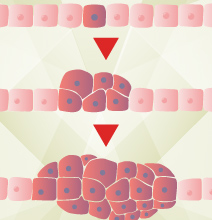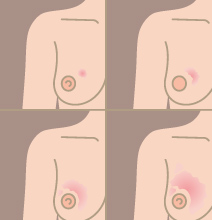Disease evolution

Disease stage reflects how advanced the cancer is, and is determined by the size and the degree of dispersion of the tumor.
The cancer stage is essential to decide on its treatment, and even to participate in clinical trials.
It is a classification based not only on the tumor pathology report, but also on several medical imaging exams (x-rays, bone scans, CT scans, PET scans or MRIs), blood tests and/or surgery reports.
Disease stage is a simplified version of a more complex analysis called TNM (that analyzes T=tumor, N=nodules, M=metastases). It comprises four levels based on tumor size, and its dispersion to the lymph nodes in the axilla, the thoracic muscles and the skin of the breast.
Higher disease grades correspond to bigger and/or more disseminated tumors.
STAGE I
The malignant tumor has a diameter of less than 2cm, and has not spread to the lymph nodes or anywhere else.
STAGE II
The malignant tumor has a diameter between 2 and 5 cm, and might have spread to the lymph nodes but not anywhere else in the body.
STAGE III
The malignant tumor has a diameter of more than 5 cm, and might have spread to the lymph nodes, the thoracic muscles or the skin of the breast.
STAGE IV
A malignant breast tumor of any size that has spread to other places in the body.





